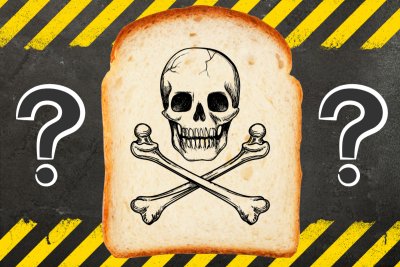White sliced loaf of death?
What does a major new series on UPFs by The Lancet mean for industrial dough products?

On 18 November 2025, The Lancet became the latest major organisation to weigh into the UPF (ultra-processed food) debate. Its three-paper series combined analysis of more than 100 studies with new research. The series echoed previously raised questions and concerns, drawing conclusions to other researchers: broadly speaking, UPFs are not good for our health or the planet.
What is UPF?
Referring to products in category 4 of the Nova classification of food, The Lancet summarised UPFs as: ‘branded, commercial formulations made from cheap ingredients extracted or derived from whole foods, combined with additives, and mostly containing little to no whole food,’ adding that ‘UPFs are designed to […] maximise industry profits.
Examples from the Real Bread Campaign's area of work include:
- Category 1: cleaned, whole grains are unprocessed.
- Category 2: flour is minimally processed. This includes wholemeal flour and ‘fortified’ non-wholemeal flour.
- Category 3: Real Bread is processed.
- Category 4: additive-laden industrial dough products (such as the sliced, wrapped, Chorleywood Process factory loaf) are UPF.
According to a 2020 report by [the food industry funded] British Nutrition Foundation, ‘bread’ (for which read, mainly, industrial dough products) account for 16-20% of UK carbohydrate intake – so a big slice of the UPFs the nation consumes.
Conclusions
The Lancet series tested three hypotheses. Briefly summarised, the authors' conclusions were:
Global displacement of long-established dietary patterns
The share of UPFs in total energy intake increased over the past three to four decades in eight of nine middle-income and high-income countries; rapid spread in low-income countries, where UPFs are not yet dominant, is indicated.
Extensive deterioration of diet quality
Exposure to the ultra-processed dietary pattern broadly degrades diet quality, including major nutrient imbalances; promotion of overeating; reduced intake of health-protective phytochemicals; and increased intake of toxic compounds, endocrine disruptors, and potentially harmful classes / mixtures of additives.
High risk of chronic diseases
Statistically significant associations for 12, including: overweight or obesity; type 2 diabetes and other cardiometabolic risk factors; cardiovascular, kidney, and gastrointestinal diseases; depression; and all-cause mortality. It is estimated that UPFs account for 14% of premature all-cause mortality in the USA and the UK.
More
‘Of the 104 studies, 92 reported associations between exposure to the ultra-processed dietary pattern and increased risk of one or more chronic disease outcomes, including all-cause mortality; cancer-related, cardiovascular-related, or cerebrovascular-related morbidity and mortality; and gastrointestinal, respiratory, kidney, liver, gallbladder, joint, metabolic, and mental illnesses.’
‘the accumulated evidence …] supports the thesis that the displacement of long-established dietary patterns by UPFs is a key driver of the escalating global burden of multiple diet-related chronic diseases.’
It’s not just human health: ‘UPFs have also been linked to environmental degradation that could compromise ecosystem resilience, increase the risk of zoonotic diseases, and accelerate climate change, through intense production practices and overconsumption.’
In response to criticism that Nova / UPF classification is imprecise, The Lancet notes: ‘misclassification of poorly detailed food items (eg, bread) does not appear to affect study conclusions.’
It's your choice
At this point, let’s head off the common accusations of scaremongering and telling people what they should / shouldn’t or can / can’t eat. The Real Bread Campaign doesn’t do any of that. While we do encourage everyone to choose Real Bread, if you want to eat (or only have access to) industrial dough product, go for it - you do you. In our work to help everyone have chances to make better-informed choices, however, we suggest that people consider the findings of large studies like this first.
We should also underline that The Lancet study looks at UPFs as a (very) broad category. It does not say that one slice of an industrial loaf, plasticky wrap, or factory bagel will kill you; and nor do we. That said, the Lancet states: ‘Ultra-processed wholewheat [industrial dough products], made with refined flour, added bran and germ, and emulsifiers, are inferior to [Real Bread] made with wholewheat flour and without emulsifiers.’
How do I avoid UPF dough products?
That’s a very good question. Our two main suggestions are:
- Make your own Real Bread, by hand or machine.
- Buy Real Bread from a small, local, independent (micro)bakery.
One size does not fit all, though, and these are just pieces of the jigsaw. We are acutely aware that neither of these is always a realistic option for everyone. As the Lancet notes: ‘The dominance of UPF products and UPF corporations means that the availability and affordability of non-UPF versions of some categories of foods can be rare, such as non-UPF bread products in the UK.’
Rather than just shrug and say: ‘let them eat Chorleywood!’ though, we continue to explore ways of making Real Bread available, accessible and affordable to more people. Big Bakers and supermarkets could step up to the plate, but generally choose not to.
Meanwhile, our Real Bread For All guide includes suggestions for small bakeries and public sector caterers. If you’re a grant funder and could back a project to expand this charitable work, please drop us a line!
What now?
We are staunch advocates for freedom of choice. We also believe absolutely that food information, skills and knowledge are invaluable elements in helping people to make better-informed choices that are better for health, our communities and the planet. The Lancet recommended: ‘further research into effective social marketing campaigns to raise awareness about the nutritional and health risks associated with UPFs, and support their implementation in dietary guidelines for informing governmental food policy and programmes.’
These alone are not enough, though. As The Lancet stated when launching the series: ‘Education and relying on behaviour change by individuals is insufficient. Deteriorating diets are an urgent public health threat that requires coordinated policies and advocacy to regulate and reduce ultra-processed foods and improve access to fresh and minimally processed foods.’ The third paper in the series lays out the authors' recommendations.
As we have long said, corporations must also do more than pay lip service to their responsibilities, with consumer protection bodies empowered to step in when businesses try to simply take the money and run.
For more than a decade and a half, one of the Real Bread Campaign’s mantras has been: more research is needed. For example, while every additive permitted for use in the UK has been tested individually and declared safe, they have not been tested in combination. When it comes to the UPF conversation, can additive-laden baked products be let off the hook altogether, as industrial dough fabricators would dearly like? Or are there particular additives, processes, or modified substances used in the Chorleywood Process or other forms of industrial dough fabrication that are in the frame for contributing to any of the elevated health risks reported by The Lancet series? To repeat – more research is needed.
For now The Lancet says: ‘Although more research is clearly warranted, the need for further evidence should not delay public health action.’
See also
- Real Bread vs. ultra-processed food
- Which supermarket sells sourdough?
- Folic acid free bread
- Loaf tanning salon lies?
- Dirty secret behind factory loaf clean labels?
Published Thursday 27 November 2025
Real Bread Campaign: Finding and sharing ways to make bread better for us, our communities and planet.







